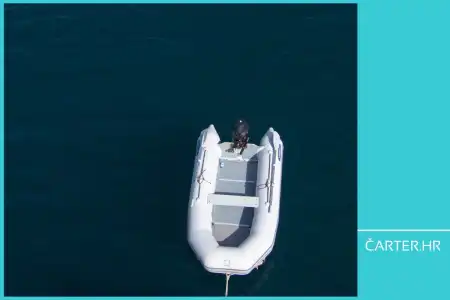
Do you think you know marketing? Think again. Many common marketing beliefs are myths that can derail your strategy. We uncover the truth behind these misconceptions so you can learn how to make your marketing efforts truly effective.
Marketing is a powerful tool for any yacht charter business, whether big or small.
Yet, there's a lot of misinformation floating around about what marketing truly entails, among those who use it for their business. And - there are also those who do not deal with marketing at all.
Misconceptions often lead to ineffective strategies and wasted resources.
So, we give you some common marketing myths and set the record straight.
Myth 1 - marketing is just advertising
Many people equate marketing with advertising, but marketing is more than just running ads.
It encompasses everything from SEO and content to social media and emails. Together, they create a comprehensive approach to reaching and engaging potential guests.
Advertising is just one piece of the big puzzle. For example, while a yacht charter company might advertise its services in luxury magazines to attract affluent clients, it also needs a solid SEO strategy to ensure it appears in search results when someone looks for yacht charters in Croatia.
Additionally, engaging social media content showcasing their fleet and destinations and informative blog posts about sailing tips and itineraries are essential to capture and maintain interest.
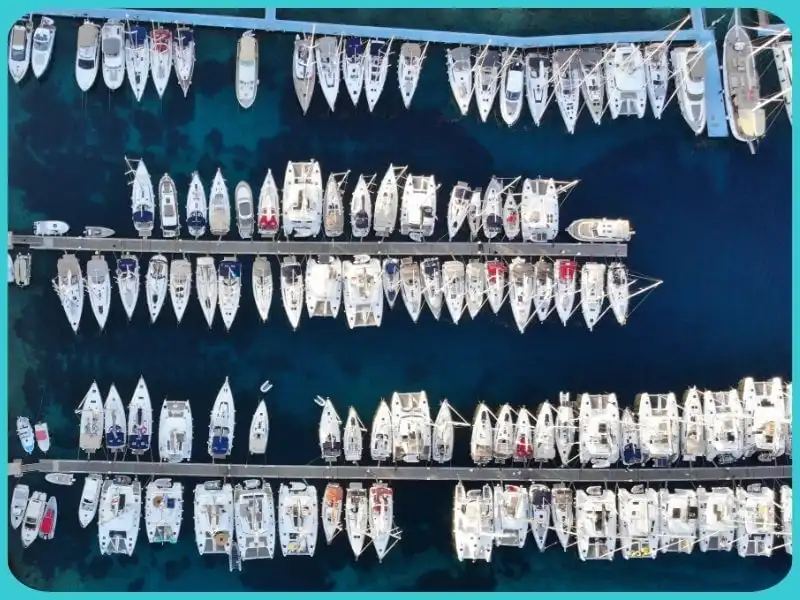
Myth 2 - marketing is only for large companies
Some believe that only large companies need to invest in marketing, but this is far from the truth.
Small businesses can greatly benefit from well-planned marketing efforts. For instance, a boutique yacht charter company in Croatia can use local SEO to attract potential guests by optimising its website for specific local search terms.
This increased their visibility in local search results, drawing in potential clients searching for nearby yacht charters.
They can also run a targeted social media campaign on Instagram and Facebook. By showing their guests testimonials, stunning views from their yachts, and similar content, they can build a strong presence online and engage their audience meaningfully.
All yacht charter companies, regardless of size, can conduct email marketing campaigns to stay in touch with past guests. This encourages repeat business, especially with the promotion of personalised offers and discounts.
Additionally, all must use content marketing. Consistently posting blogs with tips for first-time sailors, and highlights of local attractions helps establish any yacht charter company as an authority in its niche and drives organic traffic to its website.
Even a small yacht charter business can achieve significant results with thoughtful, strategic marketing, often without a massive budget, just a little time and effort.
Myth 3 - social media marketing is free
Social media marketing might appear free because platforms like Facebook, Instagram, and TikTok don't charge for basic use, post publishing, pictures, etc.
However, effective social media marketing involves various costs. If you want to be successful on social media, of course.
If you want to manage your yacht charter's social media successfully and plan content efficiently, it's advised to invest in social media scheduling tools like Hootsuite or Buffer. These tools often come with a subscription fee, but they are essential for maintaining a consistent posting schedule.
Running targeted social media ads can significantly increase your profile's reach and engagement. Advertising costs can vary, but targeted ads ensure that the right audience, such as people who are truly interested in booking a yacht charter, sees the content.
But social media requires another thing – the quality of that content.
Content also requires time and resources. If you want to elevate your social media and stand out from others, hire a graphic designer to create a visually appealing grid with your branding. Use photographers for professional images, content creators for engaging social media posts, and copywriters for SEO-optimised blogs.
Additionally, using analytics tools to measure performance and adjust strategies can be an additional cost.
But these investments should definitely take up a portion of your budget, as they are necessary to build a strong social media presence and boost bookings.
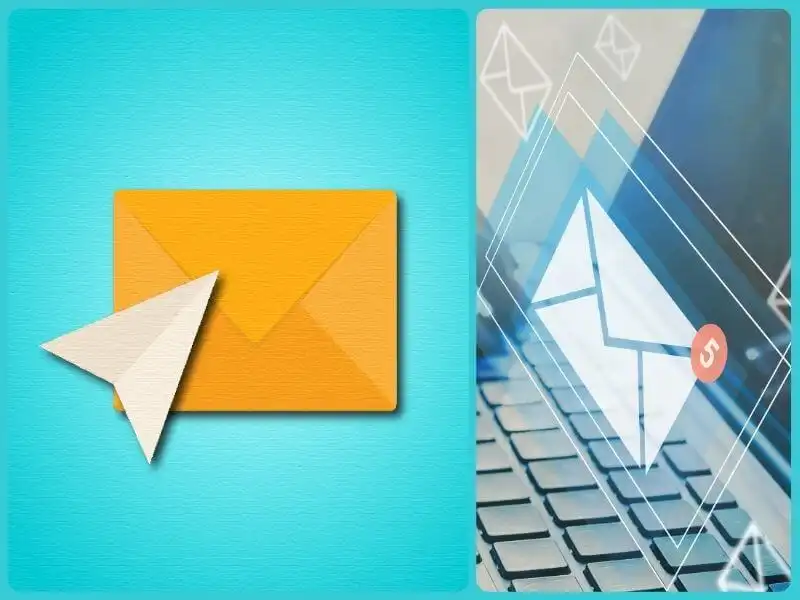
Myth 4 - email marketing is dead
Contrary to popular belief, email marketing is far from dead.
In fact, it remains one of the most effective ways to reach customers.
Statistics show that email marketing can have a high return on investment (ROI) when done correctly. Using email marketing to maintain a direct line of communication fosters loyalty, keeps clients informed, and drives repeat business.
As a yacht charter company, you can utilise email marketing in several impactful ways:
- Personalised offers - send tailored promotions based on a customer's past bookings or interests. For example, if your guests previously chartered a yacht for a family vacation, the company can send offers for family-friendly routes and activities.
- Updates on what's new - inform clients about new attractions, restaurants, and other attractions on their route or near your destinations. This keeps your guests interested and informed about their options.
- Seasonal discounts - discounts have become extremely popular lately. If you want to hop on that boat also, you can always make a special offer on your vessels for a lower price to encourage bookings.
- Customer testimonials - share stories and testimonials from previous clients to build trust and encourage new bookings. In your emails, highlight memorable experiences and positive feedback.
- Exclusive events - invite customers to exclusive events, such as a VIP preview of a new yacht or a special sailing event. This makes customers feel valued and engaged.
- Booking reminder - send reminders to clients about upcoming booking scarcity or encourage them to rebook for the next season, as this helps maintain a steady flow of business.
Myth 5 - SEO is a one-time task
SEO is not something you do once and then forget. SEO requires continuous effort to maintain and improve your website's rank.
Google often updates their algorithms, and all businesses need to keep up with these changes.
By continually adhering to SEO practices, you can ensure your yacht charter company stays competitive and visible in search engine results. The result of good SEO is attracting more potential guests and driving business growth.
Here are several ongoing SEO tasks that are essential:
- Regularly updating content - fresh content keeps a website relevant. Update your website with new blog posts on a regular basis. Don't forget to promote your blogs through social media, emails and newsletters if you have them.
- Acquiring backlinks – work on building relationships with reputable websites to gain backlinks. You can partner with travel bloggers or industry publications to enhance credibility and improve search rankings.
- Keyword research - continually researching and updating keywords to reflect current trends and search behaviours ensures your website remains relevant to what potential guests are searching for.
- Technical SEO audit - regularly conduct technical audits to check if there are any issues like broken links, slow page speeds, or mobile optimisation problems. This will keep your website in performing optimally and providing an excellent user experience.
- Monitoring analytics - tools like Google Analytics track website performance, understand user behavior, and adjust strategies based on data.
- Adapting to algorithm changes - track search engine algorithm updates and adjust your SEO strategy accordingly.
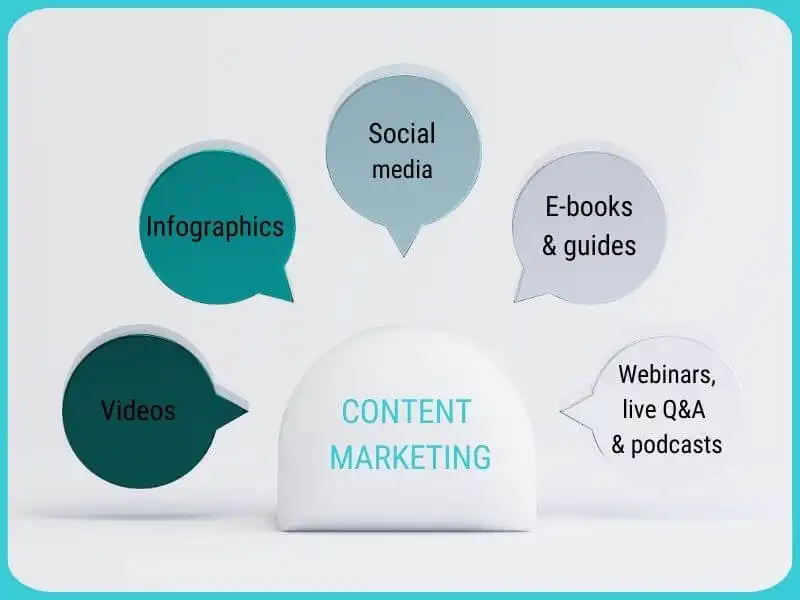
Myth 6 - Content marketing is just blogs
While blogging is a significant component of content marketing, it's not its only form.
A variety of content types helps your yacht charter company effectively reach and engage different audiences, providing valuable information and maintaining interest in your services.
And how do you expand your content marketing strategy beyond blogging? Here are a few examples:
- Videos - create video tours of yachts to give potential guests a virtual experience of your yachts and services. Videos showing the luxury and comfort of the yachts, as well as the beauty of the Croatian coast, can be highly engaging.
- Infographics - make various infographics that show the best sailing routes in Croatian Adriatic and the best locations to explore while sailing or comparing different types of yachts.
- Social media posts – share high-quality images, short videos, customer testimonials, and behind-the-scenes content on social media to keep your audience engaged and attract new followers.
- E-books and guides - create guides or e-books about yacht charters to establish your company as an authority in the nautical field and provide in-depth information to potential clients.
- Webinars, live Q&A sessions, and podcasts – host these live events to show that you and your company are experts in the yacht charter industry. This provides direct interaction with the audience, answers their questions, and builds trust. Be sure to host seasoned sailors or experts who can give insider tips.
Myth 7 - Customers will come automatically once you start marketing
We'll answer this immediately – no, they won't.
Starting a marketing campaign is just the beginning. You cannot start it and leave it be. You have to continuously monitor its success and make adjustments if you want to attract customers (and keep them).
Engagement is key. Here are several examples of how a yacht charter company can maintain and build on its initial marketing efforts:
- Consistent social media posts - regularly post on social media platforms, share comments and engage to maintain interest and attract new followers.
- Email follow-ups – send follow-up emails to people who have shown interest but haven't booked yet. Nudge them towards making a decision with personalised emails offering additional information, discounts, or reminders of the benefits of yacht charter vacation.
- Customer service - provide excellent customer service and makes sure your guests have a positive experience the whole way - from the initial inquiry through the end of their trip. Also, promptly address questions and concerns to build trust and encourage repeat business.
- Loyalty programs - loyalty program that rewards repeat customers with discounts, exclusive offers, or special perks, encourage them to return in the future.
- Content updates - regularly update website and blog with fresh content such as new travel guides, destination highlights, and customer testimonials to keep the site relevant and help with SEO.
- Customer reviews and testimonials – encourage satisfied guests to leave reviews and share testimonials to build your credibility and attract new clients. Feature these reviews on your website and social media to boosts confidence in potential customers.
- Targeted ads - run targeted social media ads on and Google based on customer demographics to reach a more precise audience, increasing the likelihood of conversions.

Myth 8 - Negative reviews will ruin your business
Don't be afraid of the negative reviews. They can be an opportunity to improve your business.
How you respond to them is crucial.
Address guests' complaints professionally and resolve any issues. The goal is to turn a dissatisfied customers into a loyal ones.
Here are several examples of effective responses to negative reviews:
- Offering discounts - if you receive a negative review about a booking mishap, offer a discount on the next trip, showing their commitment to customer satisfaction.
- Apology and solution - apologise for the inconvenience and explain what steps you have taken to resolve the issue. Demonstrate transparency and accountability.
- Follow-up communication - rebuild trust by personally reaching out to the guests to discuss their concerns and find a satisfactory resolution.
- Service improvement – show that your yacht charter company values guest’s input by using feedback to make improvements in services or operations that can prevent future issues.
- Highlight positive changes – inform your audience about the changes made based on their feedback, as this turns a negative experience into a positive one and encourages loyalty and word-of-mouth referrals.
Myth 9 - More traffic means more sales
Attracting more visitors to your website is great, but attracting the right visitors is more important.
To do so, you must optimise conversion rates, i.e. focus on turning those visitors into customers.
To make sales more successful, you must target the right audience for you and offer them seamless user experience.
Here are several examples of how to achieve this for your yacht charter company:
- Clear calls-to-action (CTAs) - ensure the website has clear and compelling CTAs, such as "Book now," "Get a quote," or "View our yachts," which guide visitors towards action.
- Engaging content - publish high-quality, relevant content that speaks to people's interests and needs, such as yacht descriptions and informative blog posts.
- Easy navigation - design an intuitive website layout that makes it easy for visitors to find information quickly, such as yacht availability, pricing, and booking procedures.
- Targeted marketing - use tools like Google Ads and Facebook Ads to reach specific demographics interested in yacht charters. Ensure your ads are relevant and more likely to convert.
- User experience (UX) improvements - continuously work on improving your yacht charter website's UX by reducing load times, ensuring mobile compatibility, and simplifying the booking process.
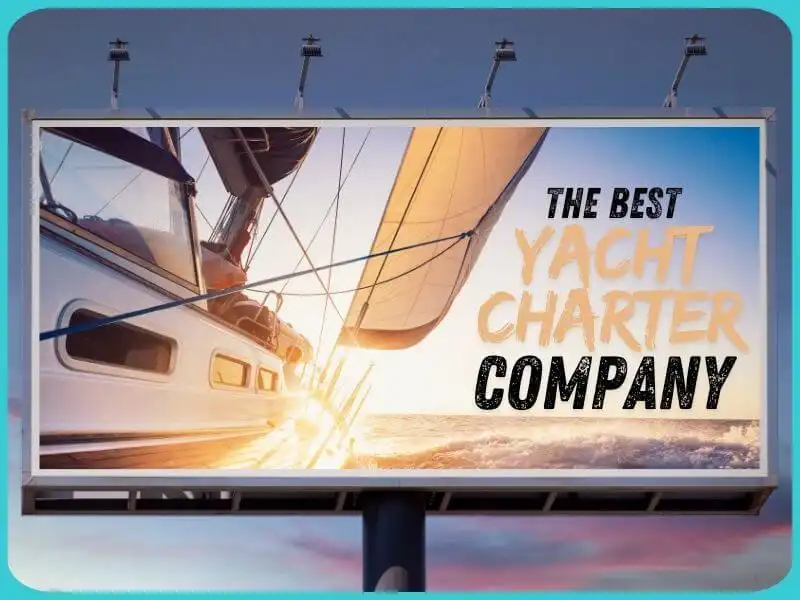
Myth 10 - Traditional marketing is obsolete
Even though digital marketing is necessary and no business is successful without it, traditional marketing methods are not to be considered redundant or dated.
Traditional marketing - print ads, direct mail, and events are still effective, especially combined with digital marketing efforts.
Here are several examples of how you can use traditional marketing:
- Print ads in magazines - advertising in high-end travel and lifestyle magazines can reach an affluent audience interested in luxury yacht charters.
- Boat shows and events - attending or sponsoring boat shows, and luxury travel expos allows for direct interaction with potential guests and industry professionals.
- Billboards and banners - placing eye-catching billboards in strategic locations, can increase local visibility, and local visibility is never to be taken lightly.
- Radio and TV spots - advertising on radio stations or TV channels can still reach a broad audience and create brand awareness.
Sometimes, you can blend traditional and digital marketing for maximum impact, such as promoting boat show appearances on social media.
Conclusion? Stop believing in marketing myths.
Understanding the full scope of marketing and staying informed about best practices can significantly improve your business outcomes.
Take a moment and reevaluate your beliefs about marketing, change your current strategies and try something new that might work better for you.
But definitely stop believing in the myths usually spread around by people whose strategies have failed because they didn't invest themselves enough. Or they thoughts are - "My guests will find where I am or their own".
The best you can do is to integrate some of these insights we gave you into your next marketing campaign for better results.
If you need help with more information, feel free to contact us.
Subscribe to our newsletter and follow us on our social media, Facebook, Instagram and LinkedIn.
Categories of trends
- News
- Sale
- Marketing
- SEO
- Web design
- Social media
- Technology
- Regulations
- Management
- Education
- Finances
- User experience
Newsletter
Sign up for the newsletter and receive the latest trends and tips straight to your inbox

